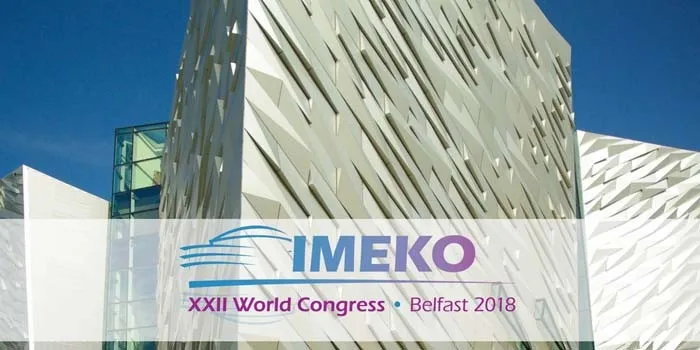Nobel Prize holders, aircraft turbines and new Hungarian members: success on IMEKO World Congress 2018
With more than 500 participants coming from many continents, the World Congress of the International Measurement Confederation (IMEKO), already in its 22nd year, concluded successfully in Belfast, United Kingdom, where Hungary was represented by our two colleagues Dr. Zsolt János Viharos, senior research fellow of the Research Laboratory on Engineering and Management Intelligence of the MTA SZTAKI andÁkos Zarándy, head of the Computational Optical Sensing and Processing Laboratory, who was elected to be an IMEKO member.
In September 2018 the International Measurement Confederation (IMEKO) scientific research organisation held its World Congress.TIt is organised every three years and lasted almost a week in Belfast, Northern Ireland, not far from the dock where the “short lifecycle ship” Titanic was built. As usual, during the weekend before the scientific week, the governing body of IMEKO had its meetings to take decisions and define operative plans for the worldwide organisation.
Scientific presentations held by Nobel Prize holders
Over 500 participants listened to hundreds of scientific presentations organised in more than 50 sessions ordered according to the 24 Technical Committees of IMEKO. Each day started with a lecture by a keynote speaker.In the first two days two Nobel Prize holders, Professor William D. Phillips and Prof. Dr. Klaus von Klitzing made very exciting presentations. Reaching as low temperature as possible is a key challenge for accurate time measurement, as was explained by Prof. Phillips (United States). In his laboratory they generated significantly lower temperature (in nano-, even in pico-Kelvin range) than the coldest temperature in the universe (which is ~3 Kelvin) for constructing an atomic clock having a measurement uncertainty of less than one second in the total lifecycle of the complete universe.
The other Nobel Prize holder, Prof. Klitzing (Germany) showed how he discovered the quantum Hall effect in a French laboratory at 2am at night, having also a French baguette and a bottle of red wine on his desk, during the analysis (later proved correct)of a signal that seemed to be a measurement uncertainty or error. He also showed therejection letter (fortunately only the first review)he received as feedback to the scientific publication of his discovery. Based on this scientific result the final standard, the kilogram – held in Versailles, Paris – will disappear.
The third keynote lecture was also connected to this topic: it presented the radical change of the International System of Units (SI) beginning on 20th of May 2019 when the current 7 base units (e.g. kilogram, meter, mol, …) will be replaced by 7 physical constants (speed of the light, Planck constant, Boltzmann constant, …). As a consequence, the physical standard-based measurement system will disappear and a new, significantly more precise, decentralized world-wide measurement-certification system will be established. It is a substantial change in the world, not only in technical but in all practical areas, assuming the representatives of the voting countries (including also Hungary) will approve it (highly likely) on 16th November 2018.
Other invited speakers presented how these discoveries and identifications result in significant but unforeseen changes e.g. in exploration of planets similar to the Earth, research in black matter or in the supervision of Rolls-Royce aircraft turbines, one of which takes off every 16 seconds somewhere in the world.
Hungarian relevance of IMEKO
The world congress had its traditional Hungarian connection, too. We can be proud that four new Hungarian researchers were elected to be new members of IMEKO (Ákos Zarándy, MTA SZTAKI – TC2: Photonics; Balázs Scherer, BME – TC10: Testing, Diagnostics and Inspection; Vilmos Pálfi, BME – TC4: Measurement of Electrical Quantities; Bálint Kiss, BME – TC17: Measurement in Robotics), moreover, our colleague, Dr. Zsolt János Viharos (who is at the same time the President of the Hungarian National IMEKO Committee) was elected to Chairperson of the Technical Committee TC10 on Testing, Diagnostics and Inspection. Since 2012 He was the scientific secretary of this Technical Committee.
The Hungarian relevance of IMEKO has to be specially emphasised, because this international scientific organisation was founded in 1958, in Budapest, Hungary. Let’s imagine, at that time how difficult and piquant it was to establish an international organisation having many members from the “West” and also from the “Eastern Block”, too, who travelled to each-other, established new contacts, started new common research activities, etc. Moreover, since its foundation, the centre of this world-wide organisation has been in Budapest and e.g. if the leaders (changed every three years) want to have any common meetings, their first duty is to come to Budapest…we can be proud having the centre of such a high prestige scientific organisation in Hungarysince its foundation – but of course, keeping this position requires continuous efforts from us.
